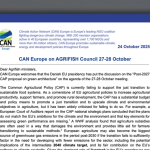Brussels, 14 May 2025 – With the third round of Nationally Determined Contributions (NDCs) due in early 2025, Climate Action Network (CAN) Europe presents a set of policy recommendations urging the Western Balkan governments to increase climate ambition and submit robust, inclusive and participatory NDCs. If developed right, these plans could provide the basis for a just energy transition and sustainable development, in line with the 1.5°C temperature goal of the Paris Agreement.
Countries in the region are among the most climate- vulnerable in Europe, while coal still dominates electricity generation and adaptation planning remains fragmented. At the same time, the region has committed to climate neutrality by 2050 and is expected to align with the EU’s climate acquis as part of its accession ambitions.
The 2025–2035 NDC cycle offers a critical opportunity to bring national climate plans in line with these commitments and support systemic transformation across all sectors. Furthermore, and as COP30 in Belém draws near and global ambition comes under the spotlight, the region has a timely chance to demonstrate leadership and a firm commitment to climate justice – both at home and on the international stage. To support the use of NDCs as investment plans, Western Balkan countries must also specify the amount and type of finance needed.
Chiara Martinelli – CAN Europe Director: “2035 marks the midpoint between when most countries began implementing their NDCs in 2020 and when many, like the Western Balkans, have pledged to reach net-zero emissions by 2050. It is now almost the last opportunity to consolidate the national plans and provide a clear vision that would tackle two main challenges in the Western Balkans: setting a level of ambition high enough to be credible to reach decarbonisation by 2050, and establishing a compatible coal-phase-out timeline.”
The new policy paper by CAN Europe and its CSO members in the Western Balkan region highlights the core expectations for the 2025 NDCs, building on CAN International’s NDCs 3.0 Guidelines. The paper identifies concrete actions needed to raise ambition and credibility, while embedding equity, participation, and finance in national plans.
Key recommendations:
Align with science and equity: Commit to economy-wide emission reduction targets for 2030 and 2035 in line with 1.5°C pathways and fair share principles, and submit long-term strategies consistent with reaching domestic net-zero emissions by 2050 at the latest.
Phase out fossil fuels: End coal subsidies and fossil fuel expansion. All countries must commit to a full coal phase-out by 2040 and rapidly scale up energy efficiency and human rights-based renewable energy systems.
Deliver just transition plans: Governments must support coal-reliant communities and ensure social dialogue, labour protection, and gender-just climate measures are integrated in national transition plans.
Scale up adaptation: All NDCs must include adaptation targets aligned with national adaptation plans and reflect region-specific risks including floods, forest fires and droughts.
Enable participation and protect rights: NDCs must embed a rights-based approach and guarantee meaningful participation of all stakeholders, including youth, women and affected communities, in planning, implementation and monitoring processes.
Mobilise finance: NDCs must function as investment strategies. Countries should clearly outline financial needs and priorities, and improve access to EU climate finance and international support mechanisms.



